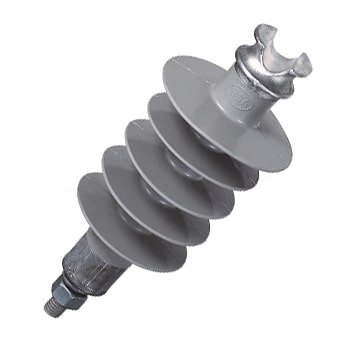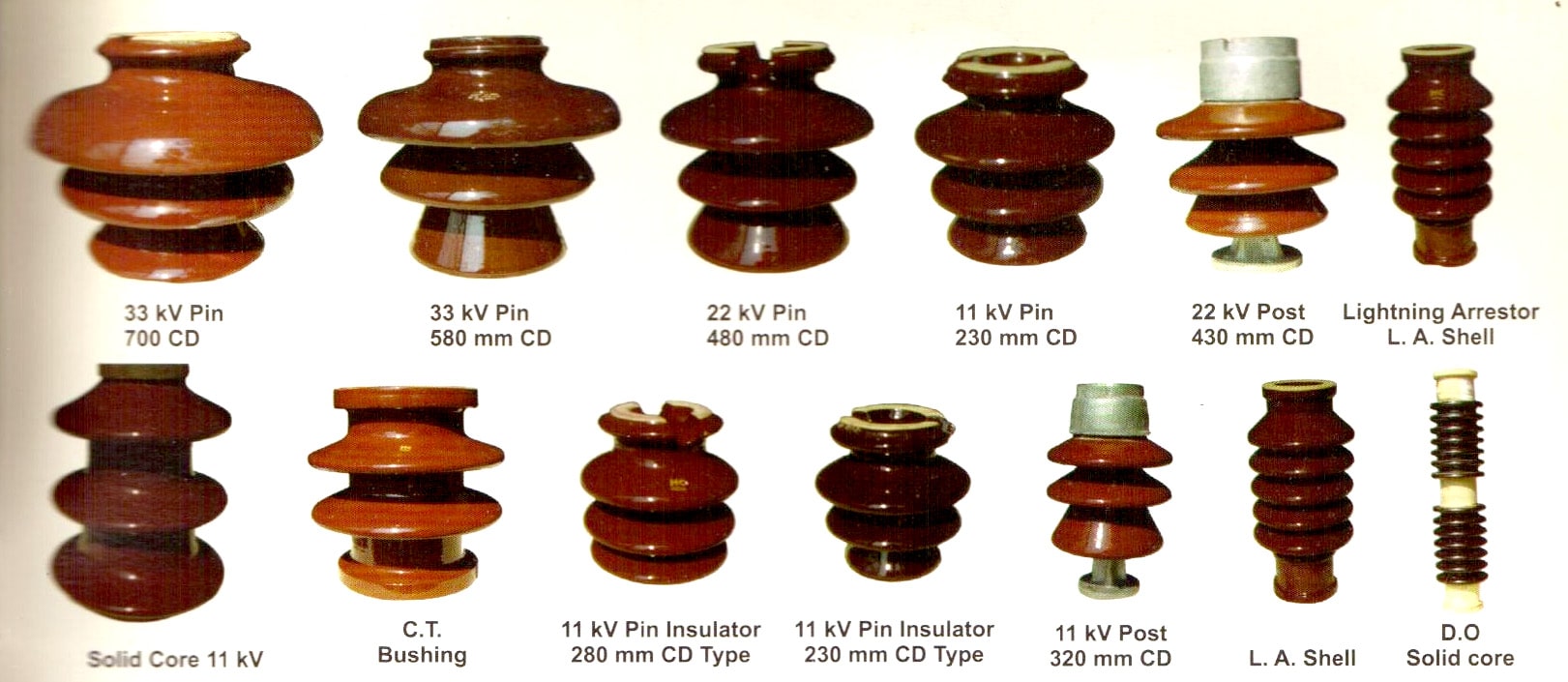What is silicone insulator?
Silicone Insulator (Silicone Rubber) is a type of insulation made of polymer. This polymer must contain silicon, carbon, hydrogen and oxygen. Due to their very good physical and chemical properties, silicone insulators are used in many industrial uses, especially in electricity supply and electrical insulation.
Silicone insulators have very good electrical properties and can be used at high temperature and with very high resistance to electric shock, chemical stability and resistance to UV rays, among other unique properties. Also, silicone insulators can be used in very low temperatures such as minus 60 degrees Celsius.
Types of Silicone Insulators
Types of silicone insulators include: post, pin, strain, spray, bell, disc, long rod and bushing insulators. Each type of silicone insulator has different applications.
Post (Rotary) Insulator: This type of insulator rotates during use and is used in motors, cameras and other devices that require direct rotation.
Pin insulator: This type of insulator has a needle that pushes the insulator into the product by pressing it towards the product. This type of insulator is suitable for use in electrical connections and pipe connections.
Strain insulator: This type of insulator has a high pressure chamber that is filled by a pump. During use, the insulation is spread by a hose to the desired location. This type of insulator is suitable for covering surfaces and for use in petrochemical and gas industries.
Spray insulation: This type of insulation has a high-pressure chamber that is filled by a pump and spread as a spray to the desired location. This type of insulator is suitable for covering surfaces and for use in various industries.
Bell insulator: This type of insulator has a special design that includes bells separated by ball bearings. This type of insulator is used in different types of turbines, flight engines, turbocompressors, etc.
Disc insulator: This type of insulator has a plate design that is very suitable for industrial applications. This type of insulator is used in devices such as pumping devices, compressors and industrial machines.
Long rod insulator: This type of isolator has a design focused on removing side effects from machine vibrations. In this type of insulator, all the necessary parts for operation are integrated and located in a common compartment. This type of insulator is used for devices such as compressors, heavy machinery and all types of engines.
Bushing insulator: This type of insulator works as a pair of bushings. These bushings are used to support rotating parts, such as shafts. Depending on the need, bushing insulators can be made of metal or polymer and are used in many different devices, such as cars.
Types of transformer bushings
Types of transformer bushings include:
-Inlet and outlet bushings
-Bushings fittings
-Cable connection bushing
-Bushing for connecting complex presses
-Bushing connection inspection and maintenance
-Bushings of standard cable
-Ventilation bushing
-Protective bushing
-Bushing installation of control and monitoring systems
-Air intake bushing
-Bushing for connection of control and monitoring cards
What is the use of bushing?
Bushings, as important components of the transformer, are used to protect the wires and connections of the transformer against various hazards such as moisture, water, dust, insects and animals, fire and electric shock. Also, bushings can be used as a place for installing control and monitoring systems, installing cables and gauges, ventilation, ventilation and protecting transformer wires against mechanical shocks.
Types of silicone insulators based on material
According to the material used in the structure of insulators, there are different types of them, which include the following:
Porcelain Insulator, which is produced from ceramic materials and is used to transmit electricity with high frequencies.
Glass Insulator, which is produced from glass and is used in high frequency power transmission and communication lines.
Polymer Insulator, which is produced from polymers resistant to water, breakage and UV and is used for power transmission lines with high voltages and in harsh weather conditions.
Ceramic Insulator, which is produced from ceramic materials with a crystalline structure and is used in different types of power transmission lines that have different conditions such as high temperature, humidity and breakage.
The advantages of glass insulators over porcelain insulators
Both glass and porcelain insulators are made of electrical insulating materials and are used in power transmission lines. But the advantages of glass insulators compared to porcelain insulators are as follows:
Glass insulators are lighter in weight than porcelain insulators, and this makes it easier to install and service. Because of their glass structure, glass insulators are more resistant to impact and breakage, and as a result, require less replacement compared to porcelain insulators.
Unlike the porcelain insulator, whose external surface becomes dirty over time due to the absorption of air pollution and moisture, and this increases its destruction and corrosion rate, the glass insulator has a polished surface and less stains, and as a result, it is more resistant to corrosion and destruction.
Glass insulators have a more beautiful appearance than porcelain insulators and are used as a beauty element in power transmission lines. Due to the mentioned advantages, glass insulators are used as an insulating element in high frequency power transmission lines and communication lines in wider applications.
Types of insulators based on application
Insulators are also classified based on their application. Some types of insulators based on application are:
Airline insulator: This type of insulator is used for connections between aerial lines.
Passing insulation (Shilling): This type of insulation is used to create a passage for cable lines on walls and ceilings.
Support insulator: This type of insulator is used to provide support for overhead lines and cables.
Restraint insulator: This type of insulator is used to restrain network cables.
Tensile insulator: This type of insulator is used for pulling and stretching network cables.
What are the characteristics and important features of Silicone Insulators?
Silicone insulators are a type of electrical insulation produced from silicone materials. These types of insulators have several features, which can be mentioned as follows:
– Resistance to electric shock
– Heat resistance
– No moisture absorption
– UV resistance
– No color change
Important components of Silicone Insulators
Silicone insulation mainly consists of three main parts, which are:
Insulator body (Silicone Insulators):
This is the main part of the silicone insulator, which is used as the main insulator and resin in the production of the insulator. Due to its high mechanical, electrical and dielectric properties, silicone insulator is used as electrical insulation in electrical equipment against weather conditions, chemical and thermal conditions.
Insulator scaffolding:
The silicone insulator scaffold is mainly made of stainless steel or aluminium, which is placed inside the insulator body and used to support and stabilize the insulator in the construction of electrical equipment.

Silicone electrical insulator
Protective cover Silicone insulator
As the outer covering of the insulator and scaffolding, the protective coating protects the insulator against various environmental and mechanical factors such as sunlight, rain, snow, chemical and thermal conditions, air pollution, etc. This coating is mainly made of silicone or resistant polymers.
What is the arrangement of insulators?
The arrangement of insulators is done in different ways depending on the type of application and the type of insulator. Two common types of arrangement for insulators are:
Chain of hanging insulators
In this type of arrangement, the insulators are connected to each other in a chain and connected to a cable connector at the end of the chain. These types of insulators are mostly used for aerial and underground power transmission lines.
Tension insulator chain
In this type of arrangement, the insulators are connected to each other in a chain and are placed above the ground level with the help of a tension wire located at the end of the chain. These types of insulators are mostly used for overhead power transmission lines.
The price and purchase of silicone insulators from “Shimi Afsoon”
As the importer of this product, “ShimiAfsoon” Company guarantees the price and quality of this product. Exchange rate fluctuations and many parameters affect the price of silicone insulators daily. The first parameter is the global selling price of silicone insulators. “ShimiAfsoon” has always tried to keep the price of silicone insulators cheaper than the market price in addition to maintaining the quality of its products.



Reviews
There are no reviews yet.